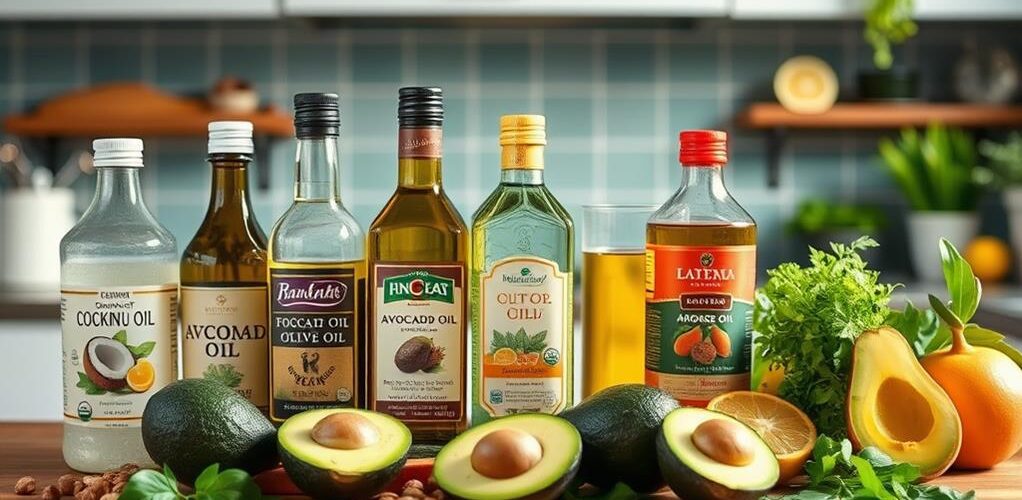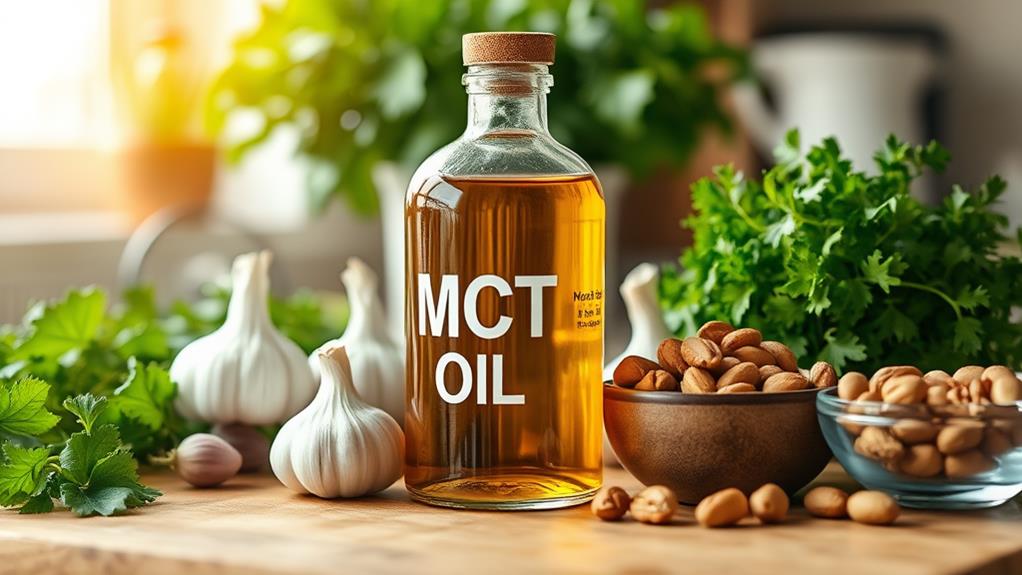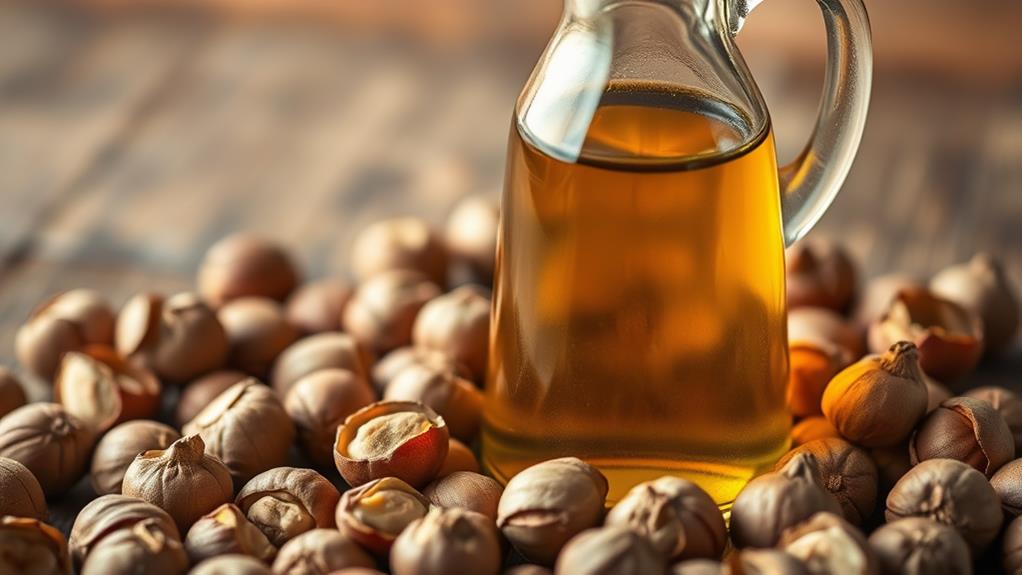
Choosing the best keto-friendly cooking oils can make or break your meal. Olive oil, rich in heart-loving monounsaturated fats, is perfect for salads and light sautéing. Coconut oil, packed with medium-chain triglycerides (MCTs), offers a quick energy boost and is great for baking. Avocado oil, with its high smoke point, handles frying and grilling like a champ. MCT oil, often used in Bulletproof Coffee, ramps up your ketone production. Ghee and butter add a nutty richness to dishes. Steer clear of oils high in omega-6 like soybean and corn oil to avoid inflammation. Stick around for more tips on this keto journey!
Key Takeaways
- Olive oil is rich in monounsaturated fats and antioxidants, ideal for low to medium heat cooking and dressings.
- Coconut oil contains MCTs for rapid energy and is suitable for low-heat cooking and keto recipes.
- Avocado oil has a high smoke point and is packed with monounsaturated fats, beneficial for heart health.
- Ghee offers a high smoke point and contains essential fat-soluble vitamins, suitable for high-heat cooking.
- Avoid oils high in omega-6 fatty acids, like soybean and corn oil, to prevent inflammation.
Understanding the Keto Diet
The ketogenic diet, often referred to simply as the keto diet, is a high-fat, low-carbohydrate dietary regimen designed to shift the body's metabolism towards ketosis. In this state, your body burns fat for fuel instead of carbs, which can help with weight loss and boost mental clarity.
But let's clear up some keto misconceptions: many people think it's just about eating tons of bacon and cheese. While those can be part of it, the real keto benefits come from choosing healthy fats and limiting processed foods.
Imagine filling 70-80% of your daily calories with fats, while keeping carbs super low. This drastic change pushes your body into ketosis. You'll notice signs like increased thirst, maybe a bit of bad breath (sorry!), and even some fatigue at first. But stick with it, and you might see some weight loss and a clearer mind.
Tracking your ketone levels can help you stay on track. Remember, not all fats are created equal. Focus on healthy sources like avocados and nuts.
The key to a successful keto diet is balance—yes, even if it's mostly fats!
Importance of Cooking Oils
Cooking oils are essential in a keto diet, as they provide the necessary healthy fats vital for maintaining ketosis. With 70-80% of daily calories coming from fats, the choice of cooking oils directly affects your success. Healthy fats, like those found in extra virgin olive oil, coconut oil, and avocado oil, support weight loss, boost energy levels, and improve metabolic functions. These oils help keep you in ketosis and guarantee you're getting the right nutrients.
The health benefits of choosing the right oils are substantial. For example, olive oil is packed with antioxidants, while coconut oil contains medium-chain triglycerides (MCTs) that support weight management.
Using oils with high smoke points, such as avocado oil, allows for versatile cooking techniques, from frying to baking, without compromising their nutritional value.
Understanding which oils to use can also enhance the flavor and nutritional quality of your meals. Cooking with the proper oils guarantees that your dishes are not only keto-friendly but also delicious and nutritious.
Avoiding oils high in omega-6 fatty acids is significant, as they can lead to inflammation, undermining your health goals. Selecting the right oils makes sticking to a keto diet easier and more enjoyable.
Olive Oil
Among the array of cooking oils suitable for a keto diet, extra virgin olive oil stands out due to its impressive nutritional profile and health benefits. Rich in monounsaturated fats and antioxidants, this oil not only enhances the taste of your dishes but also provides heart-healthy benefits.
Extra virgin olive oil is best used for low to medium heat cooking, as its low smoke point of around 375°F (190°C) helps preserve its valuable nutrients. This makes it ideal for salad dressings, marinades, and sautéing at moderate temperatures.
Here are some key points about extra virgin olive oil:
- Heart Health: Monounsaturated fats in olive oil promote cardiovascular health.
- Anti-inflammatory: Polyphenols in the oil have anti-inflammatory properties.
- Nutrient Absorption: Enhances the absorption of fat-soluble vitamins like A, D, E, and K.
- Olive Oil Varieties: Choose 100% extra virgin for minimal processing and maximum benefits.
- Olive Oil Storage: Store in a cool, dark place to maintain its quality and flavor.
Selecting the right olive oil varieties and ensuring proper olive oil storage can greatly impact the taste and health benefits of your meals.
Incorporate this versatile oil into your keto regimen for a flavorful and nutritious boost.
Coconut Oil
Coconut oil, a staple in many keto kitchens, is prized for its unique composition and health benefits. Composed mainly of medium-chain triglycerides (MCTs), coconut oil is quickly absorbed and converted into ketones, providing a rapid source of energy and supporting ketosis. This makes it a powerhouse for anyone following a ketogenic diet, allowing for sustained energy without the carb crash.
With a low smoke point of approximately 350°F (177°C), coconut oil is perfect for low-heat cooking, baking, and recipes that benefit from a hint of coconut flavor. Plus, it's rich in lauric acid, which has notable antibacterial and antifungal properties, enhancing overall health.
Coconut oil benefits don't stop there. Its solid state at room temperature and longer shelf life make it a versatile pantry staple.
Imagine whipping up coconut oil recipes like Mocha Cookies & Cream Smoothies, Keto Curried Cauliflower, or Pan-Seared Salmon with Lemon Dill Sauce. These dishes not only taste fantastic but also align perfectly with keto principles.
Avocado Oil
Avocado oil is a powerhouse when it comes to nutritional benefits, packed with monounsaturated fats that support heart health and rich in antioxidants like vitamins A, E, and D.
Its high smoke point of around 520°F makes it perfect for various cooking methods—whether you're frying, grilling, or roasting, avocado oil can handle the heat!
Plus, its subtle nutty flavor adds a tasty twist to salads, sauces, and marinades, making it a versatile star in the kitchen.
Nutritional Benefits
Rich in monounsaturated fats, avocado oil offers a multitude of nutritional benefits, particularly for heart health. These healthy fats can help lower bad cholesterol levels, reducing the risk of heart disease.
Alongside its cardiovascular perks, avocado oil is packed with antioxidant properties, making it a smart choice for those focused on overall well-being. Vitamin E, a notable antioxidant found in avocado oil, supports skin health and may help reduce inflammation in the body.
Moreover, avocado oil enhances nutrient absorption, vital for getting the most out of fat-soluble vitamins like A, D, E, and K. This means when you drizzle it on your salad, you're not just adding flavor but also boosting your intake of essential nutrients.
Its subtle nutty flavor makes it a versatile addition to many dishes, fitting seamlessly into a keto-friendly diet.
Consider these key points:
- Heart Health: Lowers bad cholesterol levels.
- Skin Support: High in vitamin E, promoting healthy skin.
- Inflammation Reduction: Rich in antioxidants that may reduce inflammation.
- Nutrient Absorption: Enhances absorption of fat-soluble vitamins.
- Flavor Versatility: Complements a variety of dishes with a nutty taste.
Incorporating avocado oil into your diet can greatly enhance your health regimen.
2. Versatile Cooking Uses
With its impressive high smoke point of approximately 500°F (260°C), avocado oil stands out as an excellent choice for various cooking methods, including frying, grilling, and roasting. This means you can crank up the heat without worrying about the oil breaking down or losing its nutritional value.
Imagine grilling a juicy steak or frying up some crispy keto-friendly chicken wings—avocado oil handles it all like a pro.
But what really makes avocado oil a superstar in the kitchen is its flavor versatility. Its mild, nutty flavor works wonders in different dishes. Whether you're whipping up a zesty salad dressing, marinating some chicken, or just drizzling it over roasted veggies, avocado oil adds a delicious touch without overpowering the other flavors.
Plus, it's packed with monounsaturated fats like oleic acid, which are great for heart health.
And let's not forget those antioxidants, like vitamin E, that help with nutrient absorption and keeping your skin glowing.
3. High Smoke Point
One of the most compelling attributes of avocado oil is its remarkably high smoke point, approximately 520°F (260°C). This makes it ideal for high-heat cooking methods like frying and roasting. Unlike many other oils, avocado oil retains its nutritional benefits when exposed to high temperatures, guaranteeing that you get the most out of its healthy fats and vitamins.
When thinking about oil selection criteria, avocado oil stands out for several reasons:
- High Smoke Point: Perfect for frying, roasting, and grilling without losing its nutritional value.
- Nutrient-Rich: Packed with monounsaturated fats, particularly oleic acid, which supports heart health and improves cholesterol levels.
- Vitamin Powerhouse: Contains vitamins A, E, and D, as well as antioxidants, which are great for your overall health and skin.
- Versatile Flavor: Its subtle nutty taste enhances a variety of dishes, from dressings to marinades, and sautéing vegetables.
- Nutritional Integrity: Retains beneficial properties during cooking, unlike many other oils that break down at lower temperatures.
These smoke point benefits make avocado oil a fantastic choice for anyone following a keto diet. Its ability to maintain its healthful qualities even at high heat guarantees that your meals are both nutritious and delicious.
Ghee
Ghee, a form of clarified butter, stands out as a keto-friendly cooking oil due to its unique composition and high smoke point of around 450°F (232°C). This makes it perfect for high-heat cooking methods like frying and sautéing.
One of the main ghee benefits is that it's packed with fat-soluble vitamins A, D, E, and K. These vitamins are essential for many bodily functions and overall health. Plus, ghee contains conjugated linoleic acid (CLA), which has been linked to potential anti-cancer properties and can help promote a healthy metabolism.
But wait, there's more! Ghee is lactose-free, so it's a great option for people who are sensitive to dairy.
And let's not forget the flavor—it adds a rich, nutty taste to your dishes. Whether you're whipping up some tasty ghee recipes or just using it as a topping for vegetables and meats, ghee is incredibly versatile.
Imagine drizzling it over roasted veggies or using it to fry eggs; the possibilities are endless. With its health benefits and delicious taste, ghee is a top choice for anyone following a keto diet.
Butter

Why is butter such a staple in keto-friendly cooking? Butter is a favorite in keto diets because it's rich in fat-soluble vitamins A, D, E, and K, which support overall health and immune function. Its rich taste enhances the flavor of many dishes, making it indispensable in keto recipes like sauces, baked goods, and sautéed vegetables.
Butter is also praised for its nutritional benefits, especially when it comes from organic, grass-fed sources. This type of butter contains more omega-3 fatty acids and CLA (conjugated linoleic acid), which may have anti-cancer properties.
However, it's essential to be mindful of its low smoke point, around 302°F (150°C). This makes it best suited for low to medium heat cooking or as a spread.
Here are some key points to remember about butter:
- Rich in essential vitamins: A, D, E, and K
- Higher nutritional quality: Organic, grass-fed varieties
- Flavor enhancer: Ideal for sauces, baked goods, and vegetables
- Low smoke point: Best for low to medium heat
- Butter substitutes: Ghee, with a higher smoke point and lactose-free
For those who are lactose intolerant or looking for alternatives, ghee is a great butter substitute. It retains the flavor while being suitable for higher heat cooking.
Animal Fats
Butter's rich flavor and nutritional benefits make it a staple in keto-friendly cooking, but another group of fats deserves attention for their unique qualities: animal fats. These include bacon grease, lard, tallow, and duck fat, all of which are high in saturated fats. This makes them perfect for high-heat cooking techniques like roasting and frying. Their stability under heat guarantees they retain their nutritional value and don't oxidize as quickly as some plant-based oils.
The flavor profiles of animal fats are distinct and rich, adding depth to dishes that other oils simply can't match. Imagine the savory goodness of vegetables roasted in duck fat or the irresistible taste of bacon grease used for frying meats. These fats not only enhance the taste but also offer fat-soluble vitamins like A, D, E, and K, which are essential for overall health and nutrient absorption.
However, moderation is key. While animal fats are beneficial for a ketogenic diet, their high saturated fat content can impact cholesterol levels and heart health if consumed excessively.
MCT Oil

MCT oil, a popular choice among ketogenic dieters, offers unique advantages due to its composition of medium-chain triglycerides.
Derived primarily from coconut oil, MCT oil contains medium-chain triglycerides that are rapidly absorbed by the body and converted into ketones, providing quick energy. This makes it particularly beneficial for those following a ketogenic diet, as it helps enhance ketone production and supports the maintenance of ketosis.
One of the most attractive MCT benefits is its versatility in the kitchen. With a smoke point of approximately 320°F (160°C), MCT oil is suitable for low-heat cooking and can be easily added to beverages like smoothies and coffee. The recommended blend of MCT oil includes caprylic acid (C8) and capric acid (C10) for ideal energy and health benefits.
Here are some key points about MCT oil:
- Rapidly absorbed and converted into ketones
- Enhances ketone production for ketosis maintenance
- Suitable for low-heat cooking, smoothies, and coffee
- Contains caprylic acid (C8) and capric acid (C10)
- Commonly used in MCT recipes like Keto Bulletproof Coffee and Keto Chocolate Ice Cream
Incorporating MCT oil into your diet can be a game-changer, offering both energy boosts and delicious, keto-friendly options.
Sesame Oil
Sesame oil stands out with its nutty flavor profile, making your dishes taste amazing.
It's perfect for high-temperature cooking like stir-frying and sautéing due to its medium-high smoke point.
Plus, it's packed with essential fatty acids, which are great for a keto diet's healthy fat intake.
Nutty Flavor Profile
Renowned for its rich, nutty aroma and flavor, sesame oil stands out as a versatile cooking oil that improves a wide range of dishes. This oil is particularly prized for its ability to provide flavor enhancement, making it an excellent addition to both simple and complex recipes.
With its deep, toasty undertones, sesame oil raises everything from salad dressings to sauces, adding a unique and memorable taste.
Sesame oil also brings a wealth of health benefits to the table. It is rich in essential fatty acids and contains antioxidants like sesamolins and sesamin, which may help reduce inflammation and support heart health.
Additionally, its nutty flavor makes it a standout ingredient in many Asian dishes, where it pairs beautifully with soy sauce, ginger, and garlic.
Here are some reasons why sesame oil is a must-have in your keto-friendly cooking arsenal:
- Enhances the flavor profile of dishes with its nutty aroma
- Ideal for salad dressings and sauces
- Contains beneficial antioxidants that promote heart health
- Complements Asian cuisine ingredients perfectly
- Provides healthy fats essential for a keto diet
Incorporate sesame oil into your cooking to experience its rich, nutty flavor and health benefits.
High-Temperature Cooking
Boasting a medium-high smoke point, sesame oil is an excellent choice for high-temperature cooking methods like frying and sautéeing. This versatile oil handles the heat well, making it perfect for whipping up stir-fries or crispy fried treats.
Why is this significant? When oils are heated beyond their smoke point, they can break down, losing nutrients and potentially creating harmful compounds. That's why following cooking temperature guidelines is essential.
One of the standout sesame oil benefits is its ability to retain its nutrients even under higher heat, thanks to its sturdy smoke point.
Imagine this: you're frying up some keto-friendly chicken, and the sesame oil not only holds up but also infuses your dish with a delightful nutty aroma and flavor. Yum!
Essential Fatty Acids
Frequently praised for its nutritional profile, sesame oil is an excellent source of essential fatty acids, particularly polyunsaturated fats that are essential for heart health and overall well-being.
These fats are significant because they help reduce bad cholesterol levels, which can lower the risk of heart disease.
One of the best things about sesame oil is its medium-high smoke point. This makes it perfect for high-temperature cooking methods like sautéing and frying. You can cook your favorite dishes without worrying about losing the oil's essential nutrients.
But wait, there's more! Sesame oil has a distinct nutty aroma and flavor that can enhance your cooking, especially if you love Asian cuisine. Imagine your salads and marinades getting a tasty upgrade!
Here's a quick rundown of why sesame oil should be your go-to keto-friendly cooking oil:
- Rich in essential fatty acids
- High smoke point for versatile cooking
- Distinct nutty aroma and flavor
- Promotes satiety and aids in weight management
- Contains antioxidants like sesamolins and sesamin
Incorporating sesame oil into your diet can offer numerous health benefits, supporting metabolic health and reducing inflammation.
Hazelnut Oil

Hazelnut oil, known for its rich essential fatty acids and distinctive nutty flavor, is a versatile addition to keto-friendly cuisine. This flavorful oil offers numerous health benefits, thanks to its high content of vitamins and minerals, such as vitamin E, manganese, and copper. These nutrients contribute to its antioxidant properties, which can help protect your cells from damage.
In terms of culinary applications, hazelnut oil truly shines. Its moderate smoke point makes it perfect for low to medium heat cooking, such as sautéing vegetables or drizzling over finished dishes. Imagine adding a splash of hazelnut oil to your favorite salad dressing—it not only enhances the flavor but also improves the dish's nutritional profile.
You can even use it in baked goods, where its nutty essence can uplift the taste of cookies, cakes, and more.
For those following a keto diet, hazelnut oil is particularly beneficial. Its healthy fat content supports the high-fat intake necessary for energy and ketosis. Plus, it serves as a flavorful substitute for traditional oils in various recipes, enhancing the taste of sauces, marinades, and even desserts.
Oils to Avoid
When following a keto diet, it's essential to know which oils to avoid to stay healthy.
Oils high in omega-6 fatty acids, like soybean and corn oil, can cause inflammation and mess up the balance with omega-3s.
Plus, partially and fully hydrogenated oils are a no-go because they contain harmful trans fats that increase the risk of heart disease.
High Omega-6 Content
While maintaining a keto diet, it's essential to be wary of oils high in omega-6 fatty acids, such as soybean, corn, and canola oil. These oils can cause an omega-6 imbalance in your body, which is not good news.
Too much omega-6 can increase your inflammation risk, messing up the benefits you get from omega-3s. Let's face it, inflammation is a major buzzkill, leading to issues like heart disease and obesity.
These oils are often heavily processed, losing the good stuff and gaining some pretty nasty by-products. It's like trading a treasure chest for a pile of junk. Refined oils high in omega-6 can also play a role in chronic diseases.
So, to keep your keto game strong, here are some oils to dodge:
- Soybean oil: High omega-6 content, processed, inflammation risk.
- Corn oil: Disrupts omega-3 balance, increases chronic disease risk.
- Canola oil: Often refined, omega-6 heavy, not keto-friendly.
- Sunflower oil: High in omega-6, can lead to health issues.
- Safflower oil: Omega-6 loaded, contributes to inflammation.
Trans Fats Dangers
Understanding the dangers posed by trans fats is essential for anyone committed to a keto-friendly lifestyle. Trans fats, usually found in partially hydrogenated oils, are notorious for raising LDL (bad) cholesterol and lowering HDL (good) cholesterol. This double whammy is terrible for heart health and can lead to serious issues like heart disease and inflammation.
The World Health Organization (WHO) even wants these harmful fats completely gone from our food supply, and many countries have already started banning them.
So, why are trans fats so bad? Well, they mess with your body's balance, making your heart work harder and your arteries clog up faster. Not exactly what you want when you're trying to stay healthy!
Plus, they can sneak into your diet through foods labeled as "trans fat-free." Always check for sneaky terms like "partially hydrogenated oil" on labels.
Luckily, there are plenty of trans fat alternatives. Opt for oils like olive oil, avocado oil, or coconut oil. These are not only keto-friendly but also great for your heart.
Making the switch doesn't just help your keto goals; it greatly boosts your overall health!
Nutrient Depletion Concerns
Nutrient depletion in cooking oils is a significant concern for individuals following a keto-friendly diet. When choosing oils, it's vital to understand how oil processing can affect nutrient retention and overall health. Some oils may seem healthy but undergo extensive processing that strips away their benefits.
Here are some oils you might want to avoid:
- Soybean, Corn, and Canola Oil: These oils are high in omega-6 fatty acids, which can mess up your fatty acid balance, promoting inflammation and other health issues.
- Partially and Fully Hydrogenated Oils: These oils are notorious for their trans fats, which can spike your LDL cholesterol levels and increase the risk of heart disease.
- Refined Oils: Extensive processing can deplete these oils of their essential nutrients, leaving you with little more than empty calories.
- Sunflower and Safflower Oil: When refined, these oils lose beneficial compounds, making them less suitable for a healthy keto diet.
- Oils with Hidden Sugars and Additives: Always check labels to avoid oils with hidden sugars and unhealthy additives that can contribute to nutrient depletion and negatively impact your health.
Choosing the right oils can make a big difference in maintaining a healthy keto lifestyle.
Frequently Asked Questions
What Oil Is Good to Cook With on Keto?
For keto cooking, avocado oil is highly versatile with a high smoke point, ideal for frying and roasting. Meanwhile, extra virgin olive oil benefits heart health and is best for low-heat cooking and salad dressings.
What Is the Healthiest Oil to Cook With and Why?
Extra virgin olive oil is the healthiest oil to cook with due to its health benefits, including high monounsaturated fat and antioxidant content. However, its moderate smoke point requires careful use to avoid degrading its beneficial compounds.
Why Do I Need MCT Oil on Keto?
MCT oil is essential for a ketogenic diet due to its rapid absorption and conversion into ketones, enhancing energy levels and mental clarity. Key MCT sources like C8 and C10 provide ideal benefits for metabolic efficiency and sustained ketosis.
Which Cooking Oil Has the Lowest Carbs?
When conducting cooking oil comparisons, it is evident from a carb content analysis that olive oil, avocado oil, coconut oil, and MCT oil have the lowest carbohydrate content, all containing zero carbs, making them ideal for keto diets.
Conclusion
In summary, selecting the right cooking oils is essential for those following a keto diet. Olive oil, coconut oil, avocado oil, MCT oil, sesame oil, and hazelnut oil all offer beneficial properties that align with keto principles. Each oil provides unique health benefits, contributing to the overall effectiveness of the diet. Conversely, certain oils should be avoided to maintain the integrity of the keto lifestyle. Making informed choices about cooking oils can greatly enhance dietary outcomes.









No Comments